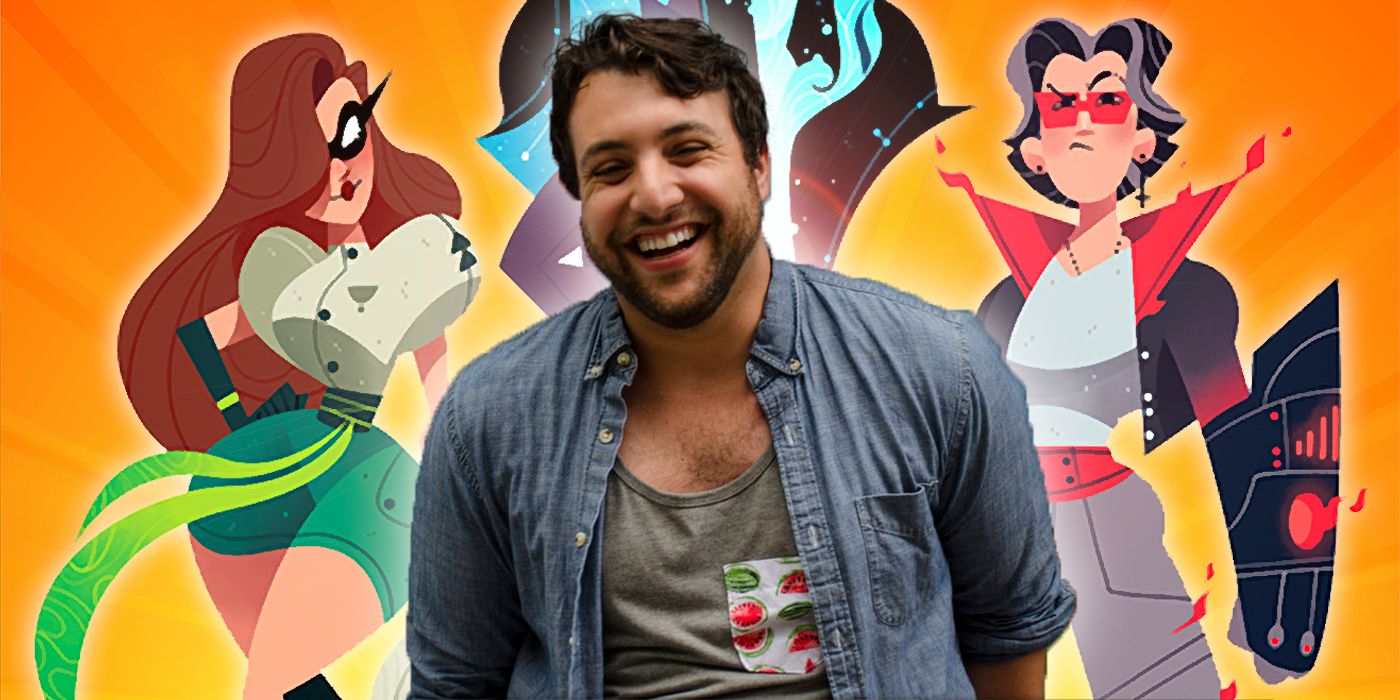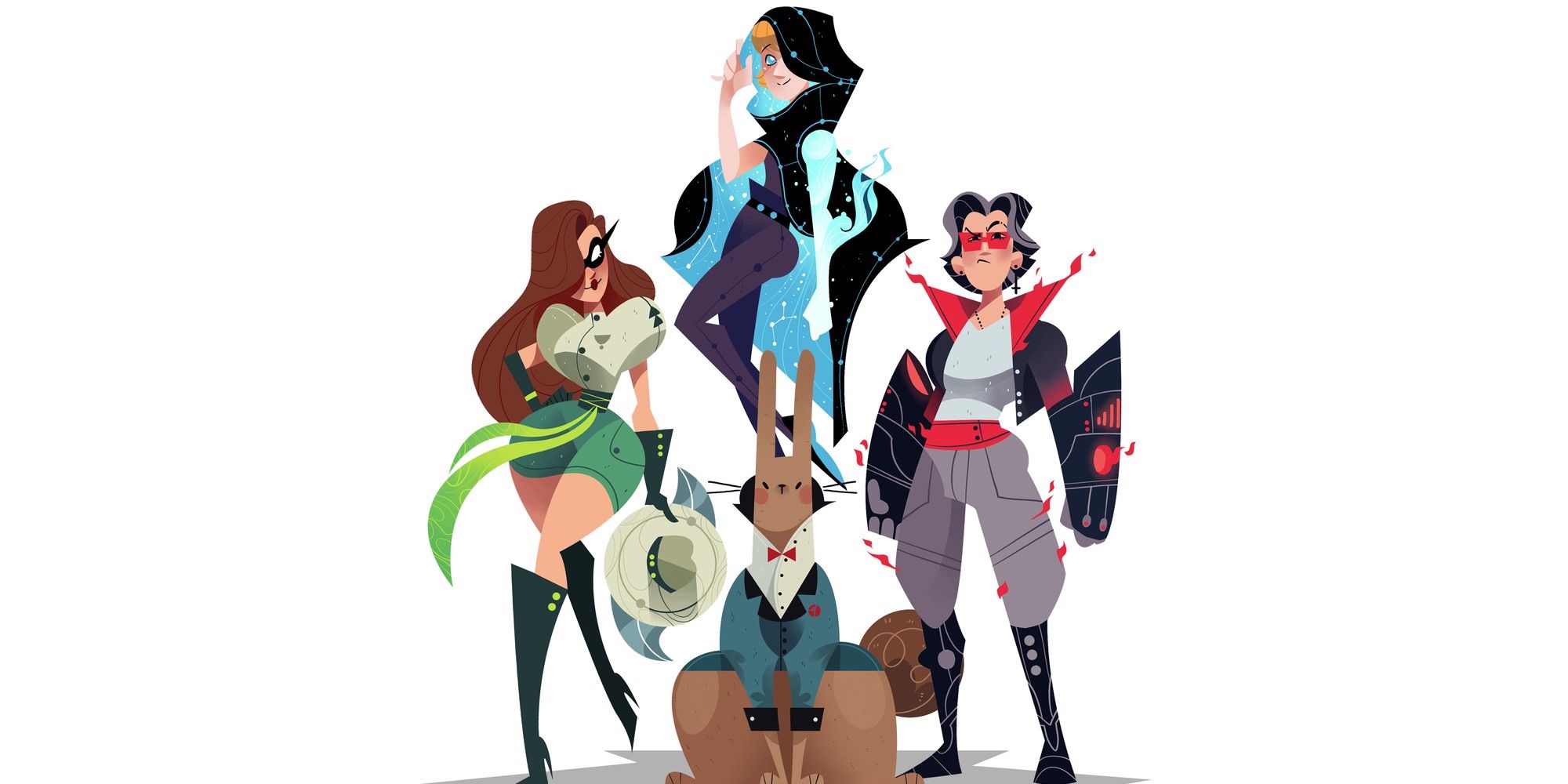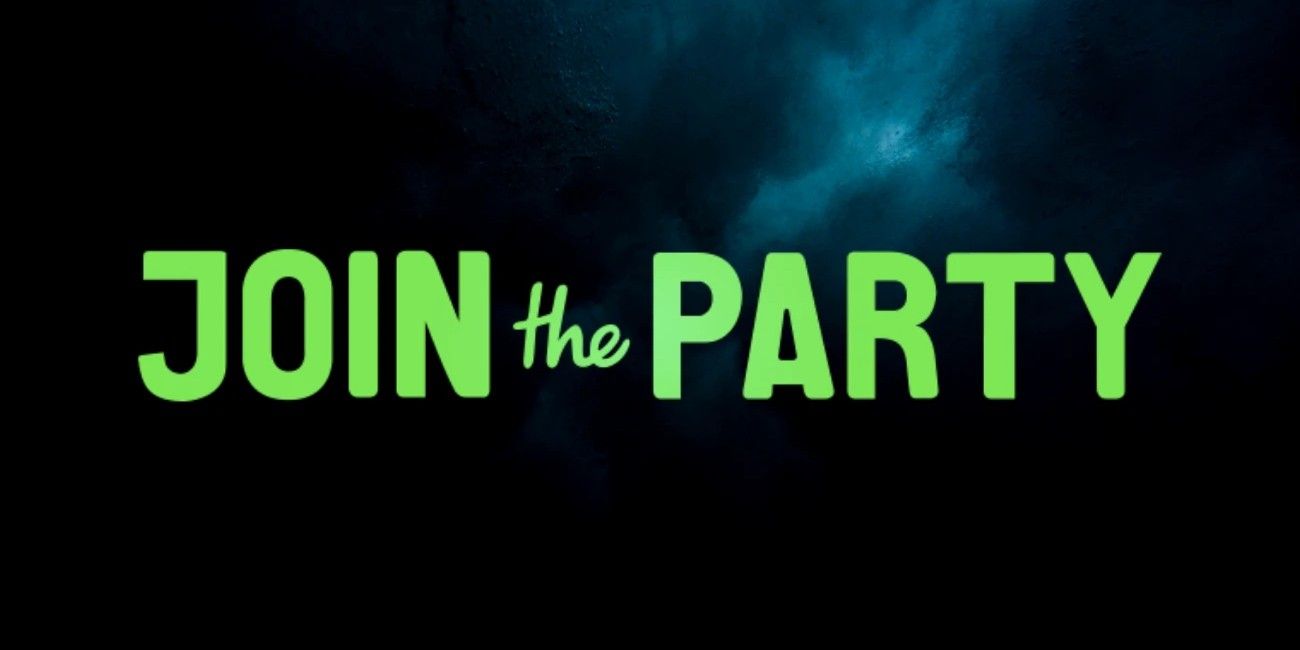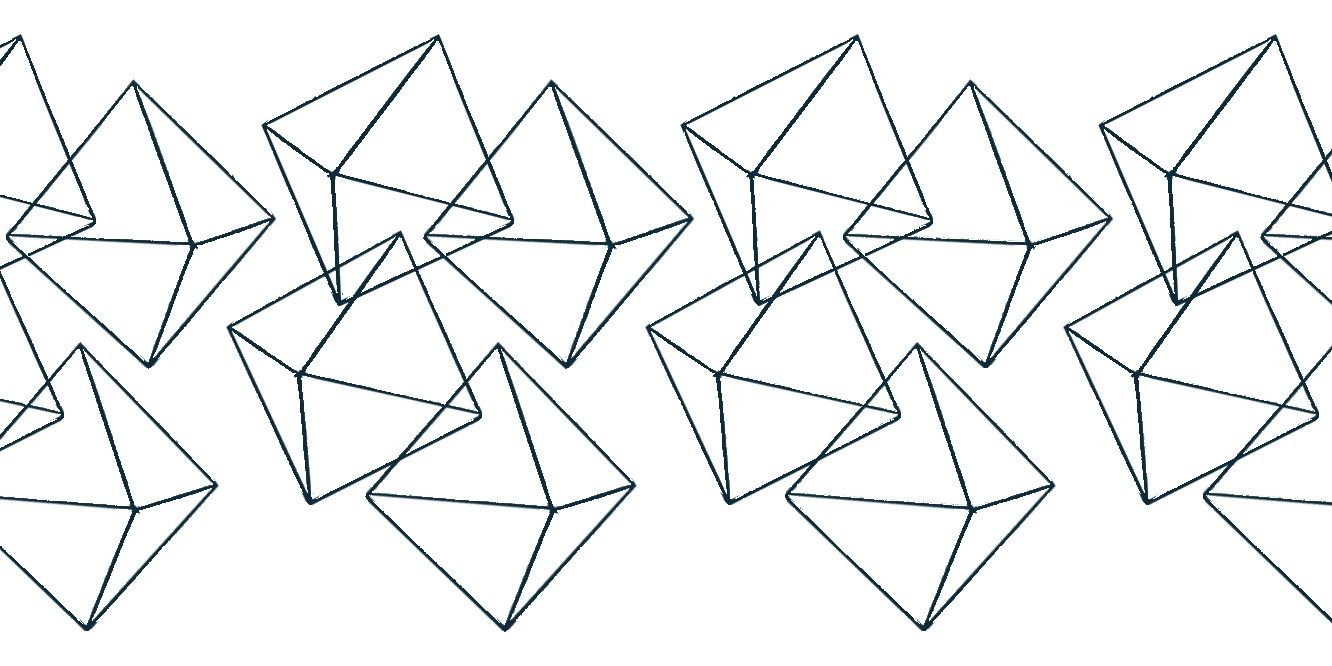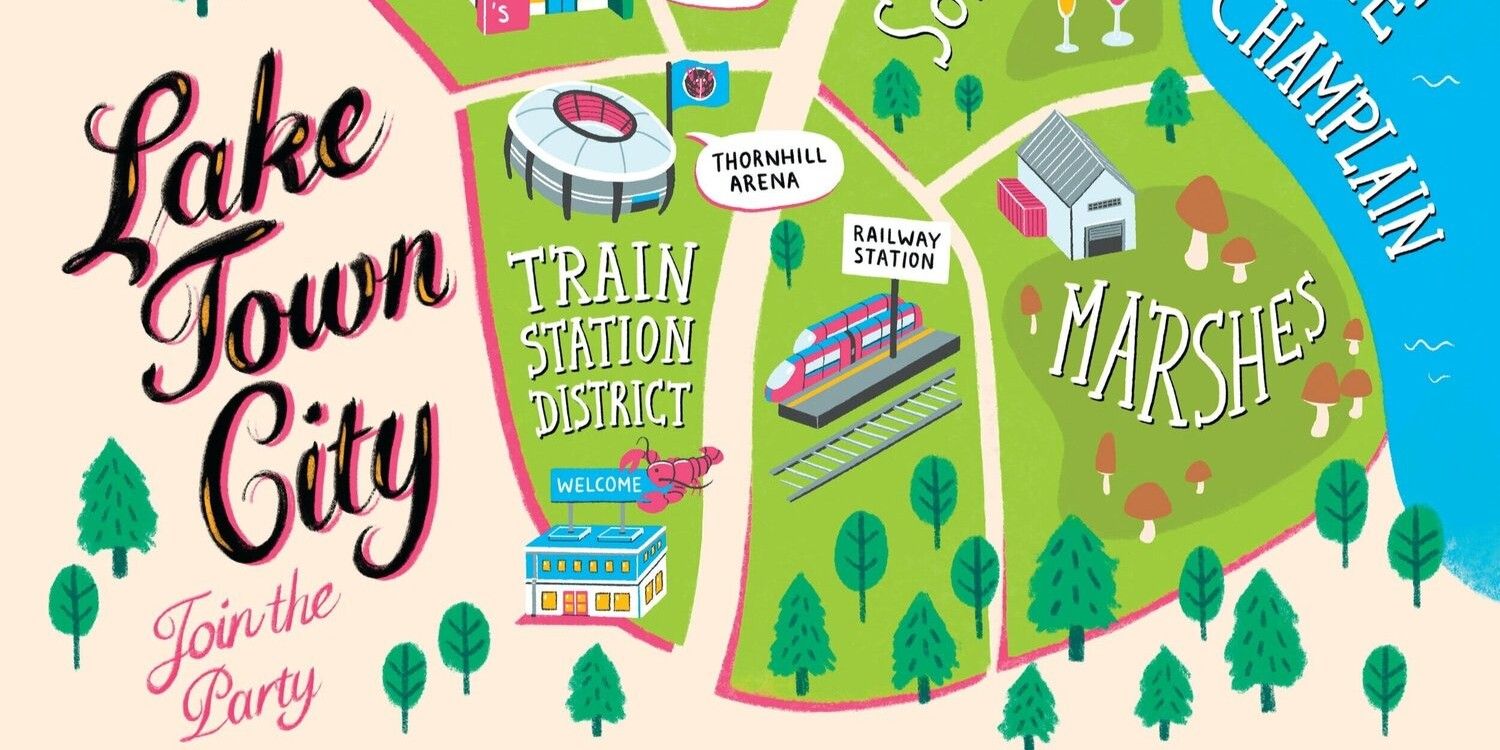Actual-play tabletop RPG podcasts have exploded in popularity, offering many people who would otherwise have been kept out of the nerdy communities around games like Dungeons & Dragons a chance to dive deep into rule systems and fantastical worlds. Join the Party, Dungeon Mastered by Eric Silver, focuses on making games even more accessible, with an emphasis on providing explanations, offering the DM and players a chance to explain their choices and taking into account real-world social issues.
Silver sat down with CBR to talk about bringing the worlds of Join the Party to life. He talks about joining the D&D wagon after learning about the game from other media and how he jumped almost immediately to DMing. Silver also discusses common pitfalls for DMs to avoid, how it can be a position of service and the responsibility he feels to tell accessible and informed stories.
CBR: What was your first TTRPG?
Eric Silver: Honestly, it was Dungeons & Dragons. I think I'm part of this new wave of people who found tabletop RPGs from podcasts and media. I had known it from Community and Stranger Things, and I was like, "Oh, this feels like something I would want to do." They just feel like they're funny; this is a funny thing to do. The TV writers, had obviously played it, and I thought, "It's wild. I haven't done this before."
Because I love stories. I went to Jewish summer camp, and there's such a tradition of folk storytelling just within all summer camps but especially Jewish summer camps because there's an extra level of cultiness on top of it -- which I mean in the best possible way, as somebody who spent 15 years of my life at Jewish summer camp. But there's such an oral storytelling tradition that I associate with living with 12 other people in a cabin and celebrating Shabbat and doing stuff like involving a campfire.
I said, "I should totally do this." Then I was listening to The Adventure Zone: Balance, which was so many people's gateway, and I was like, "Oh, this is something that people can do." I thought it was really interesting that you can use a game as a foundational engine for making a podcast. That's why I found it, and then I started playing Dungeons & Dragons.
I played a few random games -- my first character ever was Erie Goldbottle, who was a gnome Ranger. I remember specifically doing that so that I could ride on my Mastiff mount. But we only played one session, and I thought "I'm never gonna get here, I'm level one and fighting a Harpy. This is totally not going to help me." I started playing a few games, and then eventually, it must have been my fifth game of Dungeons & Dragons was me DMing for the podcast.
For the podcast?
Yeah, that was my one of my first sessions DMing, except for the one that I was running and testing. But I had not played all that much -- I'd read so much, and I'd listened to The Adventure Zone. The other funny thing is that I had started a job -- I was working at what seemed to be a smaller project within a very large media company. It was gonna solve the podcast discovery problem. The way they were doing it was that they had editors or people to listen to stuff, and then they would recommend it and eventually it would go on an app or something.
I'd volunteered -- alongside of audio fiction and some other stuff, I had volunteered to listen to Dungeons & Dragons podcasts. So I probably listened to the first episode of 100 Dungeons & Dragons podcasts in 2017. So I knew what I didn't want to listen to. There were these four pillars of mediocrity that I had thought of: the audio quality was so bad, it was so nerd-centric, it was so joke-centric you couldn't figure out what everything was doing and then, of course, the straight whiteness about it. You'd be surprised about how many of these would start with a boob joke in the first 15 minutes.
...I feel like I wouldn't be surprised.
You wouldn't be surprised but then when you hear it, you're like, "Wow, so many of these just start out like 'and this maiden -- great rack.'" And I knew what I didn't want to listen to, and that's how this show came together. It started with two co-workers and someone I knew who had started getting into podcasting on their own. Now it's become more than four years and the beginning seeds of Multitude, our podcast production company and collective.
Have you gone back to playing tabletop RPGs at all, or are you now just the permanent DM?
I have played a few times, I have a Masks group that I'm a part of and I've played a few games. I like playing, but DMing is such a service position to me, and it's something that I've realized I'm really good at. One of my first times DMing was for some friends, who were eventually everyone in Multitude. It was just to get my sea legs under me, then we started the podcast. I had done a few and then someone dropped out at the last second. I had to run a one-shot that didn't have adventuring ramifications.
I ran one where I pulled out the Monster Manual and I was flipping through and I looked at the Kuo-toa, those little fish people that, when they run around, they create a god. I'm like, "That is so interesting. It feels like exactly what a VC startup would do." So there was this adventure where this guy randomly showed up, and was like, "Hey, you guys are adventurers, would you focus group some stuff for me for my new company that I'm starting?" They went to his office and behind a double-paned glass was this Kuo-toa that was listening to what they did. I'd asked them a few like survey questions, and then it became this demi-displacer beast panther god that they had to fight at the end.
At the end, I had one of my players crying, because it was connected to their father in game, and then the god died at sunrise because they only had enough to hold it together for a few hours. I was like, "You know what, I might actually be okay at this." This is good -- I made one of my players cry, it was awesome. Julia [Schifini] is one of our players now and every so often I'm like "Julia, I can make you cry." So I really thought I was good at this.
I very much view DMing as a service position. I was a high school English teacher and as a camp counselor. There's a relationship between that and the DM and the players at the same time. Then, when you're on a podcast, the audience is like a third person in the room who you're playing to just as the players are also playing to them. If no one is listening to the teacher or no one's engaging with the teacher or no one wants to do what the camp counselor's planned, you're just a guy yelling in a room. Something I feel about Dungeon Mastering is I want you to have a good time. I think I'm kind of good at this, so I think I can do this for you. And that's why I really love DMing.
I'm in another game where I'm just DMing for fun, where I feel like I'm training in an anime montage, right? I'm watching so much One Piece right now, so I'm the Roronoa Zoro slicing things with as many swords as I can to get as strong as possible. It's like I'm an anime sportsman -- or I'm a basketball player; I'm getting my shots up. I like doing this, and I'm trying to do better. Then, also I get a chance to play in this other Masks game. I know there's a certain amount of prep in it, but I feel like I'm good at this, and this is how I participate in the event, in the group, in the community that is your game.
People talk a lot about standard mistakes that first-time DMs often make. Do you think you were able to sidestep those just from taking in so much D&D content through podcasts or watching Community and Stranger Things?
Oh, that's a good question. I would like to hope so, but probably not. The lucky thing was that, for Join the Party, there's a lot of post-production that goes into it. When we were going into this, I thought, "I'm gonna do the pre-production and the DMing." But I had Brandon Grugle, one of our players and our editor and sound designer -- I always knew that there was something to fall back on.
If I needed to stop or I had to do something or there was a conflict that we needed to resolve, I knew that we could edit it out, because I needed to get my sea legs under me. I knew that someone was going to look at this after me, and then we're going to determine what's interesting and what the audience is going to enjoy. I think my players have always been very kind and understanding, that we're all figuring this out together.
I definitely failed a few times. There are things in the first campaign of Join the Party that I wish I could change, I wish would be different. It's fun doing a second campaign now. We're not even doing a fantasy campaign anymore. We're doing this modern superhero, X-Men-style, futurist thing that I thought connected a lot more with the themes. Before, I said, "I'm just going to try to make a story, and I'm gonna see what happens." It's nice being able to take another shot at it. But also, I like making a podcast where we're not streaming; I always knew that part of the artistic creation of the podcast would involve editing.
Let's talk a little more specifically about Join the Party. Do you want to give folks a short introduction to the current season?
Absolutely. So in 1985, Dr. Cassandra Morrow discovered a new element while messing around in her lab inside of her little cabin in Laketon New York, which is this small lake town in upstate New York. She discovered this new element called diaphorum, which is incredibly powerful and clean energy burning. While she discovered that, and while everyone in the town was watching Back to the Future, it released delta radiation which changed inherently the DNA of the people who were living there. They had very low-grade superpowers -- they just looked really good at 45, or they had higher stamina. Their children, now in 202x where we're starting, have superpowers, and a lot of those people are reckoning with it.
Laketon from 1985, in 202x, is Lake Town City, the capital of New York State and about the size of Portland, Oregon. It's this futurist city that we created with some worldbuilding tools that I hacked together from The Quiet Year by Avery Alder. Now we're playing in it and re-skinning a lot of what we understand from Dungeons & Dragons to fit the X-Men superhero model about powers. It's very city-level, very Daredevil or Spider-Man, really exploring what it's like being a powered folk in Lake Town City and the responsibilities we have to power and justice. What do you do when you're unprepared but someone has thrust power in your hands?
How did you decide on re-skinned D&D as the primary system for the podcast?
I think first and foremost, Dungeons & Dragons is a storytelling device, where if you want to tell an epic story that involves fighting and action sequences, then you should use it. This is definitely the story we're still telling. Fifth Edition definitely allows a lot of interpersonal drama, but there's going to be action. There are going to be bridges exploding. There are going to be superhero fights. There's going to be walking into secret bases. And I think that Dungeons & Dragons was still able to do that.
Re-skinning it was definitely a fun concept. I will say that we did want to re-skin it and move away from fantasy with some of the frustrations that we were having with the embedded racism, sexism, anti-Semitism dyed in the wool of the fantasy genre. We wanted to do something different. The other thing is that we spend a lot of time teaching people how to play Dungeons & Dragons. In our first two episodes of Campaign One, we are doing the story and Amanda [McLoughlin] pops in and is like, "Hey, this is a saving throw. This is what we're doing." There's a lot of game education involved, so we weren't ready to move away from Dungeons & Dragons just yet because teaching new people how to play is very much a part of our whole thing.
I did a lot of work to make Dungeons & Dragons a little bit more of what we wanted. I wrote up a guide called "No Capes," which is for if you want to re-skin Dungeons & Dragons for a modern superhero world, adding that world building element. But there was a lot we could still do. We wanted to stick with the game system, even though...there was a lot of work to to change it. Listen, I love Masks. I think it's great, but I didn't necessarily want to tell a story about the feelings of teenagers or young superheroes. Everyone was in their late- to mid-30s, which I feel is also like peak adventurer time. I think that there's a lot that Dungeons & Dragons can still stretch, especially when you kind of move away from what's published in the books.
You've mentioned The Quiet Year and Masks, and I know that Campaign Two uses some Blades in the Dark-style flashbacks. Are there other TTRPGs that you've drawn on for re-skinning and influence?
Oh man, I love the flashback mechanic and Blades in the Dark. It's so good. But I also think that that demonstrates that D&D can't do everything. I would never run a heist in a D&D game. Just the timing -- and bless Dimension 20, if Brennan Lee Mulligan's gonna do it, it's gonna come out of that guy's head -- it's really difficult. The timing and the idea of initiative just doesn't fit with that.
But yeah, Blades in the Dark I really love. Those three are the big ones, I'm trying to think...the chase mechanics of Kids on Bikes I really enjoy, and the idea of resolving fights in different ways is something that I've been learning from Kids on Bikes. I really love -- the name is escaping me, another one that Avery Alder did that's like part-Jewish and part-queer communities... like Worlds Apart...it's literally on my desk, I look at it every day and the name is escaping me.
She did Dream Askew and Dream Apart.
Yes, Dream Apart. I think that remembering, because we're creating a city, creating communities and really building that stuff out in the more neighborhoods of Lake Town City was definitely something. Of course, remembering the kind of weirdness and the silliness of Jewish folk tales is something that I care about quite a lot. And remembering the kind of magic and the magic realism of those stories is definitely something you can bring to a superhero, or a powered story. I've been inspired by those as well.
Prepping for DMing a podcast is probably different from just DMing for your friends. Is there a specific ratio of combat to narrative to roleplay that you aim for in each episode?
I think the first thing that I keep in my head is that we all need to cheat towards the audience. I mean, I was a theater kid, any of you who have been on stage know you can't have your back towards the audience. Even though if you never stand like this while holding a tea kettle, you need to have the tea kettle in your proper hand so that you're not blocking yourself and you're playing towards the audience. I think it's remembering that someone else is going to look at it other than just us as players. But I think that's something that we've kept in our heads, both me as the DM and the players have all done that -- cheating towards the audience, making sure we're doing interesting things that maybe aren't too cerebral so it's fun for everyone to listen to. The editing is part of that, but also remembering that as we go into it.
I personally find that initiative is really difficult to do in a podcast because of I think the slowness and the methodology of, "We're gonna do this and do this and do this" in Dungeons & Dragon. It's history, it's a war game, you need a map, you need a mat, you want to really line all that up. I always try to find conflict or combat in different ways. I do a lot of skill challenges. We do fights sometimes, like we have one-on-one fights, which becomes more like a boxing match. I found some other mechanics from Kobold Press, they had a boxing mechanic that I used for one-on-one superhero fights. But also remembering when you can put in initiative is like, "Alright, this is when it's an action movie," or "this is like the last act of a Marvel movie," right? Let's see all the punches.
Balancing what combat looks like is something I've been doing a lot of prep, but honestly, I've been really trying to have a light touch on the reins. There is a certain amount of -- and this is so overused, so I don't mean this, but it's not railroading when you need to ride a train from one place to another, right? Sometimes you've got to ride the train. I'm setting up the campaign and that story, and I want to make sure that my players have fun playing within it. As much as I'm pushing the main story forward, I am really trying to not over prepare.
I've heard somewhere that you should only prepare half as long as you think that your session is going to be. So if you're going to have a two hour session, you should not prepare more than an hour. I really, really am trying to stick to that, because you know, I always get surprised.
The thing that we're doing right now, the arc that we're currently in is a time loop arc. And honestly, I did a lot of prep in the beginning, and I'm very loose on the reins right now because I know everything that's happening this early, but I have no idea what they're going to do next. Being able to respond and really embody the NPCs and having them react -- there's a lot of action and reaction that I'm learning in terms of the storytelling and all that fun stuff about Dungeons & Dragons. Having a loose touch on the reins definitely helps everyone. I mean, when I have editing on my side, I can be surprised and I can take a second if I need to. I love being surprised in so many different ways.
How does that play into your setup? We're all listening to this theater-of-the-mind style where you're just describing all the action. Do you share a map and plan out down to the hex where each character is?
Oh, no, I feel like -- for all you basketball heads out there, it's like you're 16 and you've never played basketball before and you have a coach come up to you and say like "Hey, you might be good at basketball. You're tall and athletic and can jump really high." And I'm like, "Alright," and then I learn basketball that way instead of knowing it from when you're a kid. I feel like because I came to it in a media sense I'm like, this is what I need to know. But now, I have no idea how to make a map. I have no map skills at all, because I've always played theater-of-the-mind, especially because it's a podcast.
I've done some video work, but not as much as a Dungeon Master. I've always done theater-of-the-mind, so my notes have to be geared towards my players. Everything I say is not going to have a visual component, so I need to make sure that my notes and everything I'm going to do is conducive to theater-of-the-mind.
Honestly, what you're looking at right now is very similar. I have my microphone, and I have a little table right here, which I currently have just my keyboard and mouse on, but I usually just have my notes on my computer. We've been playing remotely a lot lately, because one of our players is in L.A. and, you know, also the global pandemic. We bring up our Zoom or our Google Meet and then we record. So this is all my setup. I do use actual dice -- I love having actual dice, they add the feeling and the sound, for a podcast, of rolling a die is beautiful. Then, I have a DM screen in case I need to throw a bomb at someone and I need to know how much damage that does. But it's pretty bare bones; it's a lot of analog stuff.
You and Join the Party and Mulitude have done a lot of work to try to make D&D and these TTRPGs accessible to people. Can you talk a little bit about what the barriers to accessibility have been and what you've done to combat them?
The first thing that we always did was have an "After Party." Like we said, education, teaching other people how to play. I think that tabletop RPG media is a way for people to learn the game without having to interact with people who are ready to gatekeep you immediately. We have the "After Party," where after every two episodes, we talk about what I've been doing, what the players have been doing, what kind of gamesmanship goes into the stuff that we already talked about, and then the beginner's stuff -- really setting up, if you don't know how to play, you should be listening to this. We always support that in different ways.
We've had transcripts from the beginning, and we've had like pretty detailed ones. Doing a fiction show, and especially a Dungeons & Dragons or a tabletop RPG show, it has been difficult to do this. When am I in character voice? When am I just a regular person? Making sure that's as comprehensive as possible, we've been doing that since the jump. We wrote an article about that if people want that to learn how to do that as well. I mean, we're not Deaf or hard of hearing, so we made this back in 2018 to write up what we've been doing. There are a lot of resources from that as well, but we made something we realized wasn't out there, and we really wanted to share.
I think the other thing in terms of accessibility is knowing that a show is for you, or at least has the capacity to welcome you with open arms. Our players are queer, and we've been dealing with a lot of those stories. Val Vesuvio is they/them as one of our characters now. Our first episode in our first campaign started at a gay wedding. I want everyone to know what we're about from the jump.
At the same time, I feel like I have a responsibility as Dungeon Master to try to bring in as many people so that they see themselves as possible. I'm doing the best that I can, and I've tried to educate myself as much as possible. I am a straight white cis man, and understanding all of that, we've worked with consultants to make sure that what we're doing makes sense. Right at the beginning of this storytelling arc, I talked to someone about what radiation might do to someone's body and the implications of having a hereditary, passed-on radiation thing. We've talked to a few people and consultants, we paid them, and it's been really, really great.
Also, I've been trying to bring in a lot of Jewish stuff -- this is something that matters a lot to me. The idea of American secular storytelling -- really, that morality is actually Christian. That doesn't grok with a lot of people's understanding of what good and evil is, especially now in a real city. Is everything a church, or does everyone somehow celebrate Christmas? It's something that I've been very aware of, and I've been trying to bring lots of different mythologies in. We also have a mythology podcast on Multitude called Spirits, so I've been learning lots of monsters from different places and trying to drop them in.
Again, I'm trying to put the work in. I'm trying to acknowledges the privileges and the blind spots that I have, but trying to make sure that as many people as possible see themselves, or at least know that this is a welcome place to be. Then, of course, making jokes in-story and making sure that you don't need a specific pop-culture diet to love what we're doing.
Do you run into any problems specifically with telling a superhero story in the relationship between superheroes and vigilantism and even with police?
Oh, 100 percent. We started Campaign Two in 2019, and from the beginning, I was like, "Yeah, the police are always involved." This is again, part of my privilege -- the thing that I haven't been able to always acknowledge. I always thought of the police as kind of neutral. It's like, they're helpful, but sometimes they save people, I guess, and all this stuff. But of course, in 2020, we've realized that no, they don't help people. They're aggressive, and it's unhelpful. And I think that in terms of vigilantism, it's difficult, but then who do you turn to when the people who are supposed to protect you don't protect you? And I think it's more of a tough question.
And we're involved with now Mayor Dr. Cassandra Morrow, [which begs the question] can someone in an executive position help you, or are they pushing for their own benefits? Then again, when you have the power, what do you do with it? Do you help others? Or do you use it for your own personal gain, acknowledging that it might be a combination of both, and it's something that you need to deal with.
In terms of the police, it's something that I've really tried to make a hard pivot on. In the first arc, there was this guy, Brian Roper, who was a police officer who one of the characters had known. It was kind of like a Brooklyn Nine-Nine thing, it was like, "Oh, he's goofy. He doesn't know what he's doing, Aggie knows so much more than him, obviously." And then it was like, "Oh, no, this is not what we want to do." We were playing into the ideas that the police are fun and good and that kind of copaganda. Even though we weren't even doing it intentionally, we were like, "Oh, my God, here it is." Pivoting away from that has been really important.
It's definitely something we need to acknowledge and we're working on. But of course, you can't not have the police because it's a superhero story. Just acknowledging that they get in the way and they're aggressive and they don't help everyone and they don't know what to do during protests and they're trying to quell their own idea of power and what they what they expect will happen is something we're trying to acknowledge. I'm really trying to do this with a light touch and from an informed place. You put the work in, and you try to act from a place now that you're informed, like, "Oh, I made a mistake. And now I'm trying to do a better a better job."
Who's your favorite NPC to play this season?
I have a lot. I really love a lot of the core NPCs that we have. It's really hard; it's like choosing my children. I think I have brought it down to two. I have an anthropomorphic bunny in a suit, January. It's just really fun saying lewd things in a high accent or aggressive things, like "Fuck yeah dude, let's just fucking do it, it'll be fucking great." And he's just like a three foot rabbit.
But I think that my two favorites probably are...Sour Anthony. He's part of the establishment superhero team, the Upcountry Keepers. He's Flyboy and he's very Top Gun. He wears a Top Gun jacket and aviator sunglasses. He eats like Brad Pitt in the Ocean's 11 movies; he's always eating. His voice is just so bananas. He's like, [in a nasal tone] "Yeah, it's like, if everyone can just like back away. I think we're gonna take care of it, don't worry, I got it. I'm gonna look up here and I'm gonna check it out, just fly around." It's very Kermit the Frog, and the antagonism that my players have towards him is so much fun.
I think the Knight of Mirrors is my other favorite. Their a masked vigilante who has a totally covered face and rides around on a Tron-style bike and also is totally reflective -- has chrome all over their costume and their bike. Also, they're a masked figure; no one knows who they are. I marathoned all of Teen Titans when I was preparing for this because that was the ethos and the themes I was kind of going for, the balance of really heavy stuff and funny stuff and the interpersonal drama.
The Knight of Mirrors is very much like Red X as the derivative of Batman, but just like, "I'm out here doing it because I'm doing it for me and I have a very clear idea of what right and wrong is." I love playing that. They will go at any cost to protect their identity, and I think that's a very fun motivation to run. Also, they're on a goddamn Tron bike! It is so much fun to play it's like, "Alright, well I'm gonna trample and trample, then I move 60 feet," and then they're gone. It's a lot of fun to put into initiative.
Sour Anthony...I didn't even know Sour Anthony was going to be as big as possible. I always knew that Sour Anthony was gonna have that voice and that flying ability, but I didn't know how antagonistic the players were going to be with the Upcountry Keepers. Also I really love Emily Slaughter. Emily Slaughter is like the Emma Frost-style leader of the Upcountry Keepers, who's such a girl boss and has amine katana skills. I find that so interesting, jamming all of that into a lean-in girl boss has been a lot of fun to play as well. I didn't know they were all going to be so antagonistic, so having so many people who can get up in the players grill -- they're not even trying. The players hate them so much that anything I do will set them off. It's a lot of fun.
But I mean, as it goes on, I have a lot of other favorites -- playing villains is really fun. Playing Milo's friends has been really fun. Lucas, Apple and Zach Rose, just like nerdy fucking friends, very much like the guy in the new Spider-Man movie. I love that dynamic, and having three friends who are like that has been a lot of fun to play.
Join the Party Season 1 and the first 29 episodes of the current season are available at the Join the Party website and podcast streaming platforms like Spotify, Apple Podcasts and Google Podcasts. New episodes drop every other week on Tuesdays. The current season stars Eric Silver, Brandon Grugle, Amanda McLoughlin and Julia Schifini.

